Januvia 100 mg
Sitagliptin, an inhibitor of dipeptidyl peptidase-4 (DPP-4) used to treat type 2 diabetes in adults, is contained in Januvia 100 mg. People with type 2 diabetes who cannot control their blood sugar levels with diet and exercise alone are prescribed 100 mg of Januvia. It is the first-line treatment for type 2 diabetes, restoring insulin sensitivity in the body. Insulin is the hormone responsible for controlling glucose levels in the blood. Individuals with type 2 diabetes either produce insufficient insulin or their insulin is ineffective (insulin resistance). Adult-onset diabetes refers to the fact that type 2 diabetes is typically diagnosed in middle-aged or older people.
Januvia 100 mg is contraindicated for type 1 diabetes and diabetic ketoacidosis treatment. 100 mg of Januvia inhibits DPP-4 (an enzyme that breaks down the hormone Incretin). The enzyme ‘Incretins’ assists the body in producing additional insulin when necessary and in reducing blood sugar levels produced by the liver when they are not.
Januvia 100 mg should be taken either on an empty stomach or with food. For optimal results, the medication should be administered daily at the same time. Your doctor will determine the appropriate dosage, which may vary frequently based on your health. Hypoglycemia (low blood glucose levels), upper respiratory tract infection, nasopharyngitis (nose and throat infection caused by the common cold), and headache are the most frequently reported adverse effects of Januvia 100 mg.
Even if you are feeling better, you should not stop taking Januvia 100 mg without first consulting your doctor, as your blood sugar level will continue to fluctuate. If you suddenly stop taking Januvia 100 mg, your risk of vision loss (retinopathy), kidney damage (nephropathy), and nerve damage may increase (neuropathy). You should not take 100 mg of Januvia if you have severe kidney or liver disease. Inform your physician if you have a heart condition, are pregnant or plan to become pregnant, or are nursing.
Long-term use of 100 mg Januvia may cause severe pancreatitis (swelling of the pancreas) and significant renal problems. When combined with other diabetes medications or insulin, Januvia 100 mg may increase the risk of hypoglycemia (low blood sugar). In such a case, your physician may adjust the dosage of 100 mg Januvia. Certain individuals taking 100 mg of Januvia may experience severe allergic reactions such as anaphylaxis, angioedema (swelling beneath the skin), and exfoliative skin diseases such as Stevens-Johnson syndrome. The safety and efficacy of Januvia 100 mg in children younger than 18 years of age have not been established; therefore, the drug should not be administered to such individuals. There is a significant drug interaction between digoxin (a cardiac medication) and 100 mg Januvia. Patients taking both medications must be closely monitored.
Indications for 100 mg Januvia. Type 2 diabetes mellitus
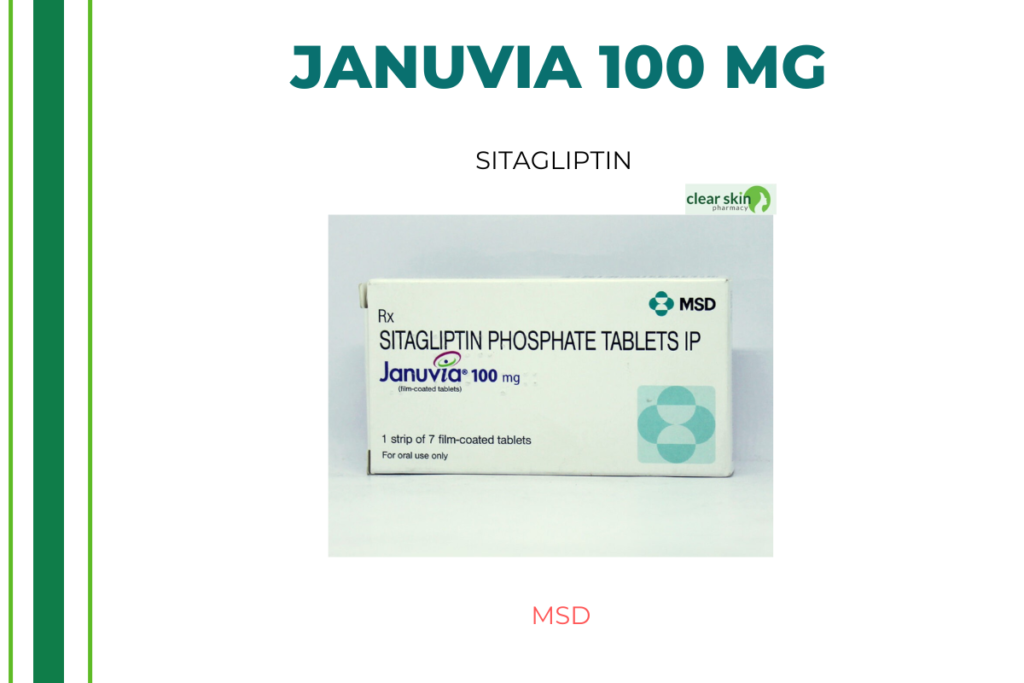
Medicinal Advantages
100 mg of Januvia inhibits DPP-4 (an enzyme that breaks down the hormone Incretin). The enzyme ‘Incretins’ assists the body in producing additional insulin when necessary and in reducing blood sugar levels produced by the liver when they are not. Thus, 100 mg of Januvia is essential for blood sugar management and the prevention of serious diabetes complications, including vision loss (retinopathy), kidney damage (nephropathy), nerve damage (neuropathy), diabetic foot ulcers, and delayed wound healing.
Use Instructions
Januvia 100 mg is recommended for daily administration. It can be consumed before or after a meal. Patients with moderate to severe renal disease or end-stage renal disease may need a dosage adjustment.
Storage Keep away from direct sunlight and store in a cool, dry location.
Januvia 100 mg Adverse Effects
Each medication has its own set of adverse effects. During the first few days of treatment with Januvia 100 mg, you may experience hypoglycemia, upper respiratory tract infection, nasopharyngitis, or headache. However, they would be temporary and could be alleviated over time. Consult a doctor if you continue to experience discomfort.
Adverse Drug Reactions
Long-term use of sitagliptin may cause acute pancreatitis (pancreatic swelling) and severe renal problems. When combined with other diabetes medications or insulin, sitagliptin may increase the risk of hypoglycemia (low blood sugar level). Your doctor may adjust your Sitagliptin dosage accordingly. Certain users of Sitagliptin may experience severe allergic reactions, including anaphylaxis, angioedema (swelling beneath the skin), and exfoliative skin diseases, such as Stevens-Johnson syndrome. Sitagliptin’s safety and efficacy in children younger than 18 years old have not been established; therefore, it should not be administered to them. Digoxin (a prescription for the heart) and Sitagliptin have been observed to have a significant drug interaction; therefore, patients taking both should be monitored closely.
Interactions Between Drugs
Sitagliptin interacts with antidepressants (bupropion), glaucoma drugs, antibiotics (cephalexin, ciprofloxacin), anti-acidity drugs (cimetidine), anti-HIV drugs (dolutegravir), ethanol, saliva-reducers (glycopyrrolate), iodinated X-ray contrast agents, anti-epileptic drugs (topiramate, lamotrigine), and heart- (ranolazine). Other medications, such as sex hormones (androgens), antioxidants (alpha-lipoic acid), pain relievers (aspirin), antituberculosis drugs (prothionamide), growth hormones (pegvisomant), and other antidiabetic drugs, may also increase the risk of low blood sugar.
Drug-Food Interaction: Excessive alcohol consumption may increase the risk of contracting the potentially fatal disease Lactic Acidosis. Therefore, alcohol consumption should be avoided while taking Sitagliptin.
Sitagliptin should be administered with caution to patients with a history of pancreatitis or pancreatic disease, as well as renal failure.
Safety Recommendations
ALCOHOL
Sitagliptin. However, exceeding 175ml could increase your risk of hypoglycemia.
PREGNANCY
Sitagliptin is a pregnancy category B medication. This suggests that there is insufficient scientific evidence for Sitagliptin; therefore, it is recommended to consult a physician.
BREAST FEEDING
Since there is limited scientific evidence for Sitagliptin, it is advised that you consult a physician.
DRIVING
Sitagliptin has no effect on the ability to drive or operate heavy machinery. However, dizziness and fatigue have been reported, which may impair your ability to drive or operate machinery.
LIVER
Rare instances of liver enzyme elevations have occurred in patients taking Sitagliptin for an extended period of time. Therefore, if you have a history or symptoms of any liver condition, you should consult a physician before taking the medication.
KIDNEY
Acute renal failure has been reported in Sitagliptin-treated patients. In extreme situations, dialysis may be required. Patients with mild, moderate, or severe kidney disease, as well as hospitalized patients with renal failure, may require dose modifications (also known as ESRD – end stage renal dialysis).
No Habit Formaed
Advice on Diet and Lifestyle
Spend at least 150 minutes per week engaging in moderate intensity physical activity or 1 hour and 15 minutes per week engaging in vigorous intensity physical activity.
Weight loss over time to achieve a healthy body mass index (18.5 to 24.9).
Substituting refined carbohydrates with whole grains and increasing consumption of fruits, vegetables, and other fiber-rich foods.
Reduce your consumption of chips, crisps, pastries, cookies, and samosas, which contain saturated fat (or hidden fat). Choose oils rich in omega-3 fatty acids for everyday cooking. Use palm oil, mustard oil, groundnut oil, rice bran oil, or safflower oil for frying.
Avoid excessive stress, as it may increase blood sugar levels. You can learn stress management techniques like mindfulness, meditation, and yoga to reduce blood sugar fluctuations caused by stress.
Emphasise the purchase of low-fat dairy products (low-fat yoghurt, fat-free milk and cheese etc.).
Maintain a blood pressure as close to normal (140/90) as possible, as this lowers the risk of cardiovascular disease in diabetics.
Additionally, this item is non-returnable.
Concern for Patients
Type 2 diabetes is a condition in which the body does not produce enough insulin, the insulin it does produce does not function properly, or the insulin it does produce is not used properly by the body. This can result in elevated blood glucose levels (hyperglycemia). Increased thirst, nighttime urination, poor wound healing, an increase in appetite, fatigue, and impaired vision are characteristics of type 2 diabetes. In rare instances, weight loss is possible, whereas weight gain is possible under certain conditions. Consequences of type 2 diabetes include neuropathy (nerve damage), nephropathy (kidney damage), retinopathy (damaged retina of the eyes or blindness), amputation of limbs, sexual dysfunction, and an increased risk of heart attack or stroke.

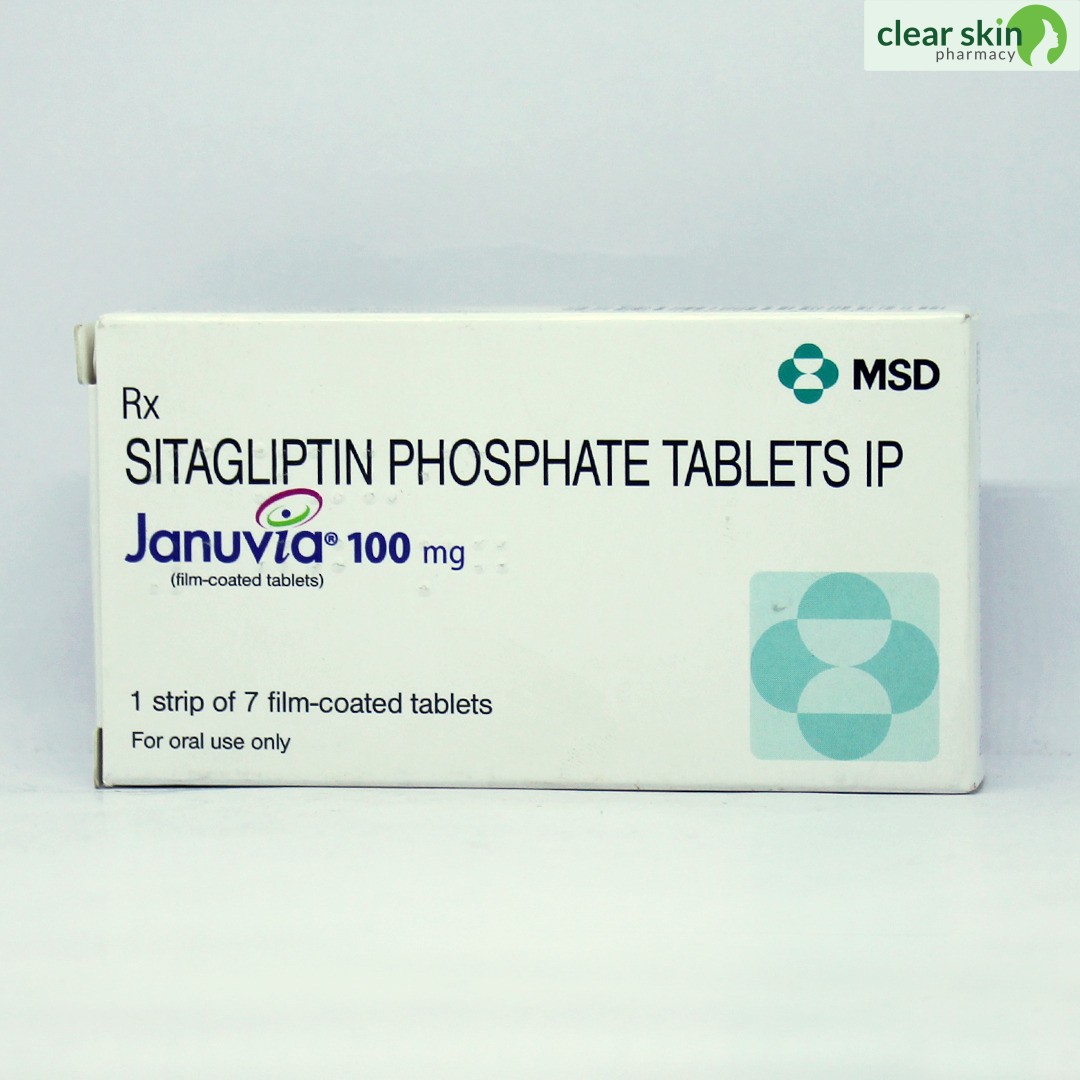
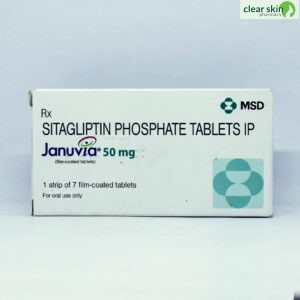
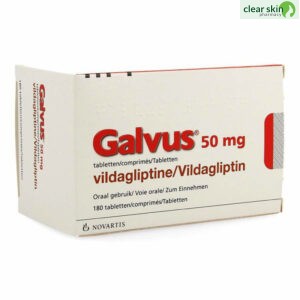

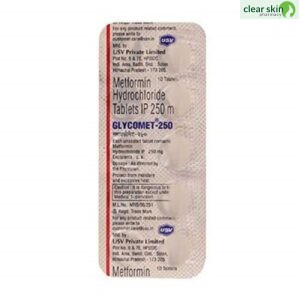


Be the first to review “JANUVIA 100 MG 7 Tablets”